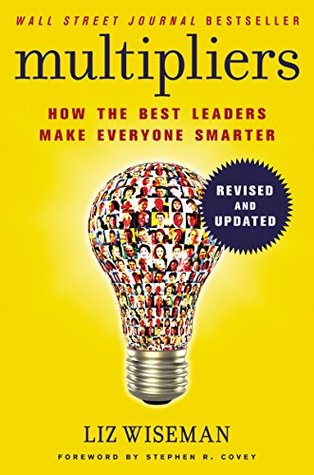More on this book
Community
Kindle Notes & Highlights
by
Liz Wiseman
Read between
March 15 - April 18, 2024
Multipliers invest in the success of others. They may jump in to teach and share their ideas, but they always return to accountability.
Multipliers understand that their role is to invest, to teach, and to coach, and they keep the accountability for the play with the players. By doing so, they create organizations that can win without them on the field.
its own or die on the vine. Similarly, in their role as Investors, Multipliers define ownership up front and let other people know what is within their charge and what they are expected to build.
“What do we know about what doesn’t work?” and “What assumptions led us to these outcomes?” and “What risks do we face now that need to be mitigated?”
“You are teaching by helping your team solve real problems. Even if you know the solution, you don’t offer it. If you do, you’ve lost the teaching moment. It has to be Socratic. You ask the question and tease out the answer.”
When we protect people from experiencing the natural ramifications of their actions, we stunt their learning. Real intelligence gets developed through experimentation and by trial and error.
“There are risks in every action. Every success has the seed of some failure.”
We judge others by their doings, but ourselves by our intentions. EDWARD WIGGLESWORTH
When the leader is always on, everyone else is always off.
While the manager sees failure and a gap they have to step in and close, employees often see success. You can hardly blame the employees for this delusion; after all, their work always crosses the finish line on time, because they are helped by the invisible hand of the Rescuer.
As leaders, sometimes we are most helpful when we don’t help.
As leaders, sometimes the faster we run, the slower others walk. When leaders set the pace, they are more likely to create spectators than followers.
When the leader sees only the upside, others can become preoccupied with the downside.
If you’ve built a reputation as a big thinker, don’t be surprised if people save the big thinking for you.
Sometimes a 90 percent solution executed with 100 percent ownership is better than getting it 100 percent right with a disengaged team.
Here are some questions you might use to elicit this feedback: How might I be shutting down the ideas and actions of others, despite having the best of intentions? What am I inadvertently doing that might be having a diminishing impact on others? How might my intentions be interpreted differently by others? What messages might my actions actually be conveying? What could I do differently?
“I can’t control the ideas that pop into my head, but I can control the ones that come out of my mouth.”
Becoming a Multiplier often starts with becoming less of a Diminisher. And this usually means doing less: less talking, less responding, less convincing, and less rescuing of others who need to struggle and learn for themselves. By doing less, we can become more of a Multiplier.
When we feel the need to be big, let it be a signal that we need to be small and dispense our views in small but intense doses.
However vast the darkness, we must supply our own light. STANLEY KUBRICK
Sometimes, the best way out of a diminishing situation is to multiply up.
What if, instead of responding with criticism and avoidance, you respond with intellectual curiosity, a hallmark of Multiplier leaders?
We choose how much legitimacy we grant to a Diminisher’s views; we choose whether or not we embrace lowered expectations for ourselves; we choose how she makes us feel. Those are choices.
A boss sharing his or her own mistakes! That could liberate an entire team and create a culture where experimentation and innovative risk taking are legitimized.
People cannot change others, only themselves. And change will occur only if an individual recognizes the problem of their own volition and has a deep desire (and incentive) to change their mode of operation.
Darkness cannot drive out darkness: only light can do that.
Because the only Diminisher you can change into a Multiplier is yourself.
When I let go of what I am, I become what I might be. LAO TZU
While the ripple effect of a single leader can be felt across an organization, no leader leads in isolation. Each leader is part of a system, and it takes leaders at all levels to build an environment where intelligence is deeply utilized.
But there is a short shelf life on inspiration without action.
Your job is to unleash the full potential of each person on your team.
Albert Einstein is credited with saying, “The significant problems we face cannot be solved at the same level of thinking we were at when we created them.”
How do you want to be remembered as a leader? Someone with a big personality? Or someone around whom other people grew?


